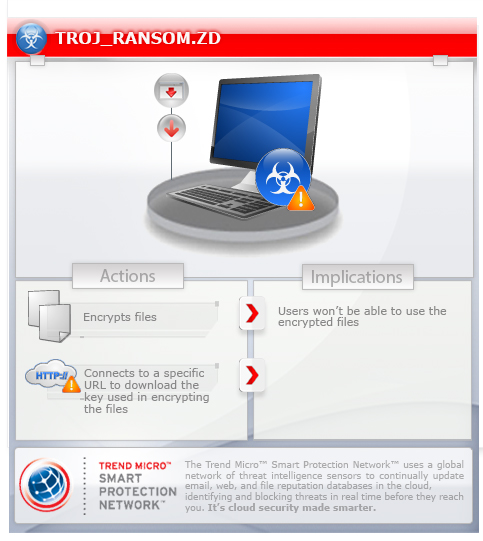TROJ_RANSOM.ZD
(Sophos) ,W32/Crypmod.F!tr (Fortinet) , (Fprot) ,VirTool:Win32/CeeInject.gen!KK (Microsoft) ,a variant of Win32/Injector.AXXQ trojan (Eset) , (Panda)
Windows 2000, Windows Server 2003, Windows XP (32-bit, 64-bit), Windows Vista (32-bit, 64-bit), Windows 7 (32-bit, 64-bit)


Threat Type: Trojan
Destructiveness: No
Encrypted:
In the wild: Yes
OVERVIEW
Downloaded from the Internet, Dropped by other malware
This ransomware specifically targets Turkish users. It arrives as a spammed message informing users about a billing invoice update. Once users clicked the links, it leads to the download of a supposedly document file, which in actual is the malware.
To get a one-glance comprehensive view of the behavior of this Trojan, refer to the Threat Diagram shown below.

This Trojan arrives on a system as a file dropped by other malware or as a file downloaded unknowingly by users when visiting malicious sites.
TECHNICAL DETAILS
393,017 bytes
EXE
Yes
18 Feb 2014
Encrypts files
Arrival Details
This Trojan arrives on a system as a file dropped by other malware or as a file downloaded unknowingly by users when visiting malicious sites.
Installation
This Trojan drops the following copies of itself into the affected system:
- %Windows%\{random characters}.exe
(Note: %Windows% is the Windows folder, which is usually C:\Windows.)
It leaves the following text files:
- {Folder Path}\LUTFEN_OKUYUN.inf
It adds the following mutexes to ensure that only one of its copies runs at any one time:
- Bit Torrent Application Instance
Autostart Technique
This Trojan adds the following registry entries to enable its automatic execution at every system startup:
HKEY_LOCAL_MACHINE\SOFTWARE\Microsoft\
Windows\CurrentVersion\Run
{random key} = "%Windows%\{random characters}.exe"
Other System Modifications
This Trojan adds the following registry entries:
HKEY_CURRENT_USER\Software\Bit Torrent Application\
Configuration
{random numbers} = "{random hex values}"
File Infection
This Trojan avoids infecting the following file types:
- avi
- wav
- mp3
- gif
- ico
- png
- bmp
- inf
- manifest
- chm
- log
- ini
- tmp
- lnk
- cmd
- bat
- scr
- msi
- sys
- dll
- exe
It avoids infecting folders containing the following strings:
- AppData
- Application Data
- Cache
- Temp
- Windows
- System Volume Information
NOTES:
It encrypts files in physical drives and append ".sifreli" in its filename.
A ransom message is contained in the file LUTFEN_OKUYUN.inf.
It may connect to the following URL to download the key used in encrypting the files:
- https://{BLOCKED}omain.dp.ua/gate2.php
However, the site is currently inaccessible.
SOLUTION
9.700
10.614.05
18 Feb 2014
10.615.00
18 Feb 2014
Step 1
Before doing any scans, Windows XP, Windows Vista, and Windows 7 users must disable System Restore to allow full scanning of their computers.
Step 2
Identify and terminate files detected as TROJ_RANSOM.ZD
- Windows Task Manager may not display all running processes. In this case, please use a third-party process viewer, preferably Process Explorer, to terminate the malware/grayware/spyware file. You may download the said tool here.
- If the detected file is displayed in either Windows Task Manager or Process Explorer but you cannot delete it, restart your computer in safe mode. To do this, refer to this link for the complete steps.
- If the detected file is not displayed in either Windows Task Manager or Process Explorer, continue doing the next steps.
Step 3
Delete this registry value
Important: Editing the Windows Registry incorrectly can lead to irreversible system malfunction. Please do this step only if you know how or you can ask assistance from your system administrator. Else, check this Microsoft article first before modifying your computer's registry.
- In HKEY_LOCAL_MACHINE\SOFTWARE\Microsoft\Windows\CurrentVersion\Run
- {random key} = "%Windows%\{random characters}.exe"
- {random key} = "%Windows%\{random characters}.exe"
- In HKEY_CURRENT_USER\Software\Bit Torrent Application\Configuration
- {random numbers} = "{random hex values}"
- {random numbers} = "{random hex values}"
Step 4
Search and delete this file
- {Folder Path}\LUTFEN_OKUYUN.inf
Step 5
Scan your computer with your Trend Micro product to delete files detected as TROJ_RANSOM.ZD. If the detected files have already been cleaned, deleted, or quarantined by your Trend Micro product, no further step is required. You may opt to simply delete the quarantined files. Please check this Knowledge Base page for more information.
Did this description help? Tell us how we did.

